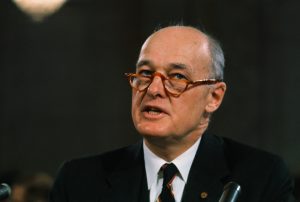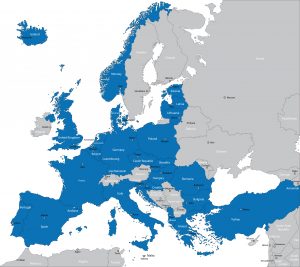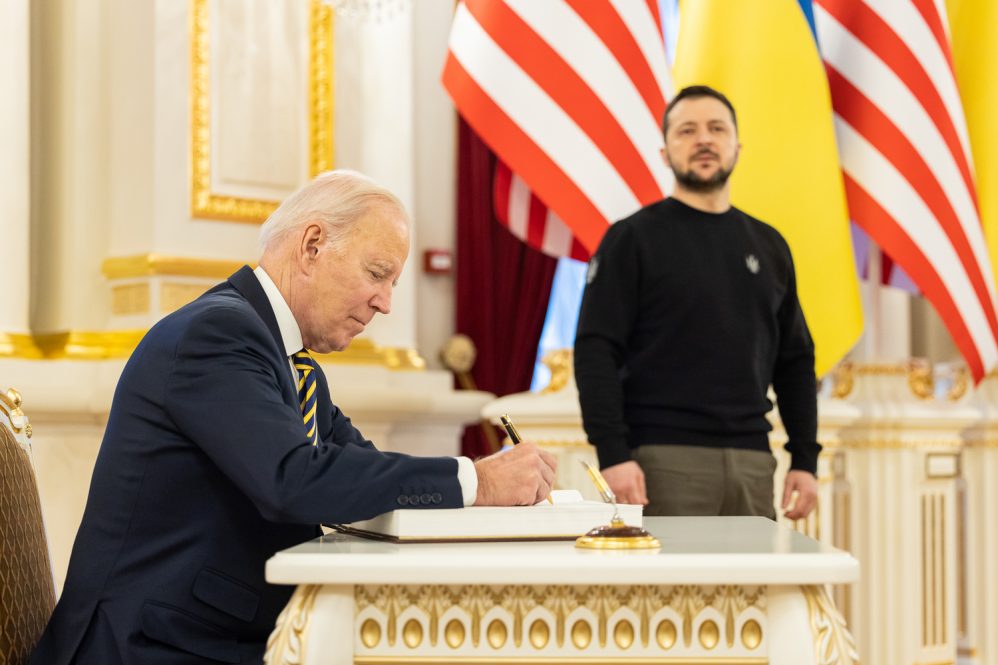Were Cold War strategist and American diplomat George F. Kennan alive today, as the world marks the grim one-year anniversary of the war that began in February 2022 with the Russian invasion of Ukraine, he wouldn’t hesitate to warn about a possible third world war if the conflict continues.
“He definitely would be worried about that, and his focus would be trying to prevent that,” Board of Trustees Distinguished Professor Frank Costigliola says. “He would stress that this is a scary situation and, based on his reactions to previous conflicts, particularly when the United States and Russia were involved directly or by proxy, he would emphasize that the United States needs to push both sides to negotiations.”
Kennan, who died in 2005 at the age of 101, spent considerable time in Russia as an American diplomat in the 1930s, ’40s, and ’50s, learning to speak the language even better than Joseph Stalin, who never lost his Georgian accent. His 1946 “Long Telegram” from Russia had a major role in shaping U.S. policy in the postwar world.
Costigliola says that while Kennan was at first an influential voice in the instigation of the Cold War, he spent the next 50 years trying to ease relations between the Soviet Union and the United States. He tried to communicate to U.S. officials that, while Russia was a difficult country to contend with, the U.S. needed to understand the Russian perspective – if only to co-exist peacefully.

“The war in Ukraine is a horrible mess, and there’s no justification for the war, but Kennan would emphasize that there is an explanation for its origin. Understanding that history is a prerequisite for successful diplomacy to prevail,” says Costigliola, who teaches in the history department in the College of Liberal Arts and Sciences and last month published both the biography “Kennan: A Life between Worlds” (Princeton University Press) and the essay “Kennan’s Warning on Ukraine” in Foreign Affairs magazine.
Much of that history relates to the eastward expansion of NATO following the collapse of the Soviet Union, Costigliola says. In the late 1990s, Kennan, himself in his 90s, used his close ties to the Clinton administration to warn that allowing countries in Eastern Europe to join the U.S.-led alliance would be construed by Russia as a threat.
And, through the years, as country after country became NATO allies, Russian leaders registered their concern.
“From the Russian perspective, when the Soviet Union broke apart, the understanding, encouraged by American officials, was that NATO would not advance eastward. That was not formally put into the agreement, but that’s the sense Gorbachev gathered from the negotiations in 1990-91,” Costigliola says. “That’s what the Russians believed, and to a certain extent what people believe is important.”
Even though Ukraine hasn’t joined NATO, the addition of other countries on Russia’s borders and the West’s military support of those countries – coupled with the United States’ 2019 withdrawal from the Intermediate-Range Nuclear Forces Treaty, signed by Ronald Reagan in 1988 to eliminate medium-range U.S. and Russian missiles – were taken by Russia as unfriendly acts.
“From the Russian perspective, the United States, with its military weapons and its intelligence support, is already involved in the war in Ukraine, and we have to recognize that entails a big risk. Kennan would emphasize that risk,” Costigliola says. “He was a champion of diplomacy. He argued that even if at first the U.S. and Russia – or any party X and party Y – seem far apart and agreement seems unlikely, such divergence can be narrowed through diplomacy. Diplomacy is a process of secret, patient bargaining. Initial positions are just that, the asking price in an eventual deal.

“That’s not to say diplomacy is an abracadabra waving of the wand,” he continues. “But I think Kennan would advocate diplomacy, meaning negotiations by experts who know the opposing side well, who know the culture, history, and emotional disposition of those they are trying to reach an agreement with.”
The potential for the annihilation of both the United States and Russia in a nuclear war can’t be ruled out, Costigliola says. With regard to the war in Ukraine, “If diplomacy is not pursued and if unconditional surrender is unattainable, the only other alternative is catastrophe. What else is there?”
Even after the United States dropped its two atomic bombs on Japan in World War II, the Japanese refused to surrender, he notes. The Japanese still insisted on retaining their emperor, a concession the United States agreed to in some last-minute diplomacy.
“From Putin’s point of view, the Russians were taken advantage of at the end of the Cold War,” Costigliola says. “While we may not agree, that belief, widespread in Russia, is a reality that we need to contend with.”
Take the hypothetical: Imagine that China has a military alliance with Venezuela. Then, China begins to expand that alliance northward, recruiting nations in Central America and starts talking to Mexico. Of course, the United States would resent these moves, as no country wants hostile forces on their border.
“The Russians’ perceptions are important. That’s not to say that we have to give in to their side, but we have to take their perception into account in order to protect American interests, and Kennan knew that,” Costigliola says.
He saw Russia, despite its bluster and aggression, as a nation with a perpetual inferiority complex regarding the U.S., Costigliola says: “The United States is far richer, far more successful, and far more powerful than Russia. America leads in technology, and it makes friends with other nations through soft power. The Russians have to build their alliances in more brutal ways. They often act out like a child. That’s not to excuse their actions, but it helps to understand them.”
Kennan understood Russia and knew what it was likely to do, Costigliola adds, which is why at the end of the Cold War he pushed for diplomacy. He wanted an understanding with Russia that would withstand the test of time and not fall apart in a few years, which would mean Russian interests had to be considered, even though Russia was temporarily weakened after the Soviet collapse.
A longstanding agreement in regard to Ukraine is just as important, Costigliola says.
“The war in Ukraine will eventually end with compromise; the question is, what kind of compromise,” Costigliola says. “We need to remember that every day this war goes on, more people are killed. There’s more infrastructure destroyed by the Russians, and Ukraine’s rebuilding is going to be that much more difficult. The risk of escalation is present and increasing. It’s a difficult situation. We need to keep our eyes open and realize the potential dangers.”
He adds, “If there is a nuclear war, which is not out of the realm of possibility, the extent of the death and destruction would be mind-boggling. We tend to put that out of our minds and say no one wants that, so it can’t happen, but that’s just happy talk. Kennan understood the dangers.”



